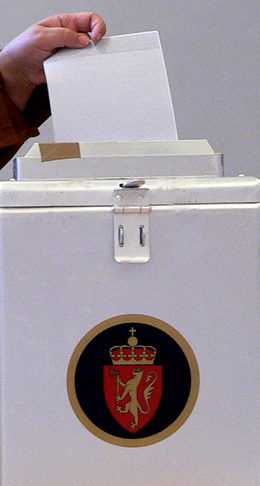The 2013 Parliamentary Election
The elections to the Storting and the Sami Assembly were held on Monday 9th September. The State Opening of the 158th Storting will take place on Wednesday 9th October. What happens when a new Storting convenes?

The Ministry of Local Government and Regional Development is responsible for the administration of elections. You will find all the results of this year’s elections on the Ministry’s election portal: Election results (Norwegian only).
For more information about the 2013 Parliamentary Election, see The Parliamentary Election.
The new Storting
When the newly elected Storting convenes for the first time on 1st October, the first Member on the list from the party that has received the most votes in each county will present the credentials for all the Members elected from that county. The credentials state which Members have been given the mandate to meet in the Storting. The Credentials Committee examines the credentials and considers the recommendation that has been put forward by the Preparatory Credentials Committee.
If the Credentials Committee finds there to be serious errors or breaches of the rules, a new Election may be called.
Until the credentials have been approved, the Members of the Storting are considered to have a temporary seat and vote only.
After the Credentials Committee’s recommendation has received its final approval on 7th October, the Storting elects the Presidents and Secretaries at a constituent sitting on 8th October.
Change of Government
Parliamentary Elections take place every four years in Norway. It is at these times that the Norwegian people elect the new Members to the Storting (the Norwegian Parliament), which is the democratically elected national assembly. Since Norway operates under a system of parliamentarianism, a Parliamentary Election often has major consequences for the country’s Government. The Government is dependent on the support of a majority in the Storting for it to be able to carry out its work. This means that a newly composed Storting may lead to a situation in which the Government loses its parliamentary support and has to step down. In such cases, a new Government will be formed on a different parliamentary basis.
New Members in the event of a change of Government
A change of Government will mean that a certain number of the elected Members of the Storting will be appointed as government ministers or state secretaries in the new Government. (It should be pointed out that a constitutional amendment that would prohibit Members of the Storting from being appointed as state secretaries will be considered during the 2013-2017 parliamentary term.) In Norway, it is not permitted for the same person to be a member of the Government and a Member of the Storting simultaneously. Consequently, Any Member of the Storting appointed to the Government must be replaced by a Substitute Member for the duration of their term in office.
Minority governments
Jens Stoltenberg’s centre-left coalition Government has had the support of a fixed majority in the Storting, but this does not necessarily need to be the case. In fact, minority governments with fixed or varying support from opposition parties have been the norm in Norway.
For any new minority Government, the work in the Storting would change somewhat. Since it is less likely that proposals from a minority government would receive a majority in the Storting, the outcome of matters put forward for consideration would be less predictable. Opposition proposals would be more likely to gain a majority.
The Fiscal Budget
In the event of a change of Government after an election, it is the departing Government that puts forward the draft Fiscal Budget to the Storting for the forthcoming year. A new Government would have the opportunity to make certain adjustments to this, but would not have the time to do the huge amount of groundwork that a totally new Budget would require.
New parties and small parliamentary party groups
A Parliamentary Election will sometimes lead to the election of Members from parties that have not previously been represented in the Storting. The last time this happened was when Steinar Bastesen was elected to represent what later became called the Coastal Party for the county of Nordland in 1997.
The representation of small parties in the Storting has consequences for the allocation of Members to the different standing committees in Parliament and the distribution of speaking time in parliamentary debates. Although such allocations should be made in direct proportion to the overall composition of the Storting, in practice small parties are given a slightly greater share than their size would otherwise indicate in order that they may also have a fair chance.
All parliamentary party groups must be represented in the Standing Committee on Scrutiny and Constitutional Affairs, and all tend to be represented in the Standing Committee on Finance and Economic Affairs. Because of this, certain Members, particularly from the smaller parties, are given special dispensation to serve on more than one committee.
Constituting the Storting and the State Opening of Parliament
The Storting will convene at 12:00 on Wednesday 1st October. The Credentials Committee’s recommendation will be considered on Monday 7th October, and on Tuesday 8th October the 158th Storting will convene for its constituent sitting, at which the new Presidium is elected.
The President of the Storting and the five Vice Presidents are formally elected by the Members of the Storting by written ballot, but this is done after negotiations have taken place between the parliamentary party groups. The principle of proportional representation has also generally been observed in such cases. This means that the President comes from the largest party group, the First Vice President from the second largest party group, and so on. Departures from this custom do sometimes occur, however.
The State Opening of the 158th Storting will take place on Wednesday 9th October at 13:00.
Last updated: 16.09.2013 16:19